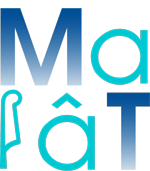Recent studies have shown that the microbiome, the trillions of microorganisms of thousands of different species living on or within our body, plays a key role in educating, regulating, and influencing our immune system, in turn influencing our response to cancer and cancer treatment.
Patients & Healthcare Professionals
We are developing innovative, safe and efficient Microbiome Ecosystem Therapies to address the need of patients living with cancer.
At MaaT Pharma, we believe patients need innovative therapies to fight life-threatening diseases with a focus on cancer.

Healthcare professionals (HCPs)
Research Collaborations and Partnerships
Collaborations are in our DNA. Since day one, we have placed partnering at the core of our drug development strategy — with academic and clinical institutions as well as industry.
Our commitment is to deliver innovative microbiome ecosystem therapies to patients fighting cancer worldwide and we believe in the need to design and conduct clinical research studies with third-party academic and pharmaceutical partners. Therefore, we are open to opportunities of collaborating, primarily in the fields of hemato-oncology and immuno-oncology.
In France, information for compassionate use needs to be submitted via ATU@maat-pharma.com.
If you are interested in collaborating, please contact us at hcp@maat-pharma.com or via the form below:
Hemato-oncology: Hematopoietic Stem Cell Transplantation and Graft-vs-Host-Disease (GvHD)
What is allo-HSCT?
Patients with liquid tumors (such as leukemia or lymphoma) may receive an allogeneic Hematopoietic stem cells transplantation (allo-HSCT) in order to replace their cancerous cells. This is a highly desirable treatment, as it can be curative of the cancer. However, harsh chemotherapy and antibiotic conditioning treatments severely damage the gut microbiome of these patients. Importantly, recent studies have shown that higher microbiome’s richness and diversity are associated with a higher survival rate in patients receiving allo-HSCT, which may be tied to a lower risk of developing graft-vs-host disease and a lower risk of developing infections. It is posited that as the microbiome is a key partner to a functional immune system, a damaged microbiome may result in a dysfunctional immune reaction to the host.
What is Graft-vs-Host Disease?
In about 35-55% of patients receiving allo-HSCT, the received stem cells may perceive the recipient’s body as foreign and attack it. The resulting disease is called graft-vs-host disease (GvHD). In its acute form (aGvHD), it affects approximately ~ 8,500 cases/year in the U.S. and Europe alone. aGvHD is a severe inflammatory condition that affects mostly the skin, Gastrointestinal tract and liver; the most severe (“grade III-IV”) cases have a very poor survival expectancy.
The standard first line of treatment is corticosteroids, but only about 50% of patients respond positively to treatment, and because the corticosteroids lower the immune response, they may result in other complications such as infections.
What does MaaT Pharma develop for these indications?
MaaT Pharma is developing high-richness, high-diversity, standardized Microbiome Ecosystem TherapyTM MaaT013 and MaaT033 dedicated to restoring the microbial ecosystem and normalize the immune response of patients who receive HSCT and those who develop aGvHD:
Immuno-Oncology: Melanoma and Other Solid Tumor Cancers
What are ICIs?
Immune Checkpoint Inhibitors (ICI) are treatments that aim to turn the immune system against cancer cells. While highly effective, these drugs only work for 20-50% of patients depending on the indication. Recent research has suggested that the patients’ gut microbiome diversity and richness, as well as its composition, impacts the response rate and overall survival rate in patients receiving ICI in multiple indications (including melanoma, non-small cell lung cancer, renal cell carcinoma, …).
What does MaaT Pharma develop in immuno-oncology?
MaaT Pharma is developing a new range of co-cultured, oral Microbiome Ecosystem Therapies (MaaT03X) and will be launching a series of clinical trials dedicated to leveraging the gut microbiome richness, diversity and its key functional networks to improve clinical response to ICI treatment.
Frequently Asked Questions
What's the microbiota? What's the microbiome?
The “microbiota” is the assemblage of microorganisms (all the bacteria, archaea, eukaryotes, and viruses) present in a defined environment.” More specifically, the microbiota varies according to its surrounding environment. For example, ‘gut microbiota’ refers to the microbiota in the intestinal tract.” Microbiome is defined as “the entire habitat, including the microorganisms (bacteria, archaea, lower and higher eukaryotes, and viruses), their genes, and the surrounding environmental conditions.”
What are gut microbiota richness and diversity?
Richness refers to the total number of bacteria present in the gut microbiota. Diversity refers to the number of different species in the gut microbiota. Both can be estimated using specific indexes derived from the number of genes observed with high throughput sequencing methods. High levels of richness and diversity have been associated with a healthy microbiome.
What is dysbiosis?
Dysbiosis is an imbalance of the gut microbiota relative to its healthy status. Notably, dysbiosis is understood as the opposite of symbiosis, i.e. the healthy interplay between the gut microbiome and the host. At MaaT Pharma, we are especially interested in the relationship between the microbiota and the immune system of the host, and how dysbiotic states may impair the immune response and negatively impact cancer patients’ clinical outcomes.
What are MaaT Pharma’s Microbiome Ecosystem Therapies?
MaaT Pharma’s products, Microbiome Ecosystem Therapies (MET), are high-diversity, high-richness, indication-specific product candidates aiming to leverage the full functional diversity of a large microbiome ecosystem.
What is the difference between MaaT Pharma’s MET-N and MET-C product range of products?
MaaT pharma has developed two ranges of MET: MET-N and MET-C.
- MET-N are donor-derived, standardized, candidates aiming to restore a functional gut microbiota in patients with severe, often iatrogenic (i.e. due to treatment), dysbiosis. MaaT Pharma has been a pioneer in establishing rigorous donor screening, stringent quality standards and industrial cGMP manufacturing processes to develop and manufacture MET-N products MaaT013 and MaaT033.
- MET-C are designed, co-cultured, standardized, indication-specific candidates aiming to modulate the patient’s gut microbiome to improve clinical outcomes. MaaT Pharma has developed a unique, ground-breaking, patented, ecosystem cultured technology allowing to replicate and leverage, at large industrial scale, the richness and diversity of native-based microbiomes while tuning the resulting product to indication-specific compositions, based on AI-driven analysis of healthy subjects’ and patients’ data.
How do MaaT Pharma’s Microbiome Ecosystem Therapies approach differ from other live biotherapeutic products approaches (e.g. single-strain bacteria or consortia of bacteria)?
The gut microbiota is an ecosystem, where billions of live organisms, especially bacteria, form functional relationships between themselves and with their host. MaaT Pharma believes that bacterial richness, diversity and functional networks are the three drivers of the microbiome’s functionality. Richness and diversity provide a foundation, onto which specific functional networks perform specific physiologic activities. MaaT Pharma applies this philosophy to the development of Microbiome Ecosystem Therapies (MET), which aim to leverage the full functional diversity of a large microbiome ecosystem.
Comparatively, other approaches may focus on a single strain or a consortium (i.e. 2 to a few dozen strains) of bacteria to achieve a given function, potentially missing out on the full complexity of the microbiome.
How do MaaT Pharma’s MET product candidates differ from fecal microbiota transfer (FMT)?
Fecal microbiota transfer or transplantation (FMT) consists of transferring a donor’s stool to the intestinal tract of a receiving patient, (usually aiming to restore a healthy gut microbiota from a dysbiotic one). As each FMT derives from one donor, and FMT is generally performed at point-of-care, FMT is not standardized regarding the quantity, and quality (composition) of the preparation.
In contrast to FMT, MaaT Pharma’s MET-N products , while also derived from donors, are standardized products which achieve higher levels of richness and diversity compared to a single donor and contain ButycoreTM, thanks to patented processing. Donors and donations are subject to a highly stringent vetting process, including biological testing to avoid pathogen.
MaaT Pharma’s MET-C products (MaaT03X) are designed using the proprietary gutPrint(TM) artificial-intelligence-driven platform which enables a high level of control of the product’s composition. They are submitted to the same level of scrutiny as the MET-N products regarding safety and quality.
All MET products are produced under cGMP manufacturing conditions and are evaluated as investigational drugs under the regulatory oversight of agencies such as the EMA and FDA. Each study is conducted with rigorous safety monitoring and reporting procedures.



